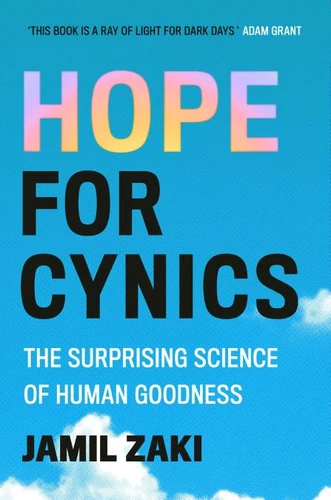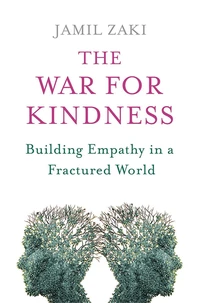Hope for Cynics. The Surprising Science Of Human Goodness
Par :Formats :
Disponible dans votre compte client Decitre ou Furet du Nord dès validation de votre commande. Le format ePub protégé est :
- Compatible avec une lecture sur My Vivlio (smartphone, tablette, ordinateur)
- Compatible avec une lecture sur liseuses Vivlio
- Pour les liseuses autres que Vivlio, vous devez utiliser le logiciel Adobe Digital Edition. Non compatible avec la lecture sur les liseuses Kindle, Remarkable et Sony
- Non compatible avec un achat hors France métropolitaine
 , qui est-ce ?
, qui est-ce ?Notre partenaire de plateforme de lecture numérique où vous retrouverez l'ensemble de vos ebooks gratuitement
Pour en savoir plus sur nos ebooks, consultez notre aide en ligne ici
- Nombre de pages288
- FormatePub
- ISBN978-1-4721-4817-9
- EAN9781472148179
- Date de parution03/10/2024
- Protection num.Adobe DRM
- Infos supplémentairesepub
- ÉditeurRobinson
Résumé
Cynicism is making us sick; Stanford psychologist Dr Jamil Zaki has the cure - a 'ray of light for dark days' (Adam Grant, #1 New York Times bestselling author). For thousands of years, people have argued about whether humanity is selfish or generous, cruel or kind. But recently, our answers have changed. In 1972, half of Americans agreed that most people can be trusted; by 2018, that figure had fallen to 30%.
Different generations, genders, religions and political parties can't seem to agree on anything, except that they all think human virtue is evaporating. Cynicism is a perfectly understandable response to a world full of injustice and inequality. But in many cases, cynicism is misplaced. Dozens of studies find that people fail to realise how kind, generous and open-minded others really are. And cynical thinking worsens social problems, because our beliefs don't just interpret the world; they change it.
When we expect people to be awful, we coax awfulness out of them. Cynicism is a disease, with a history, symptoms and a cure. Through science and storytelling, Jamil Zaki imparts the secret for beating back cynicism: hopeful scepticism. This approach doesn't mean putting our faith in every politician or influencer. It means thinking critically about people and our problems, while simultaneously acknowledging and encouraging our strengths.
Far from being naïve, hopeful scepticism is a more precise way of understanding others, and paying closer attention re-balances how you think about human nature. As more of us do this, we can take steps towards building the world we truly want.
Different generations, genders, religions and political parties can't seem to agree on anything, except that they all think human virtue is evaporating. Cynicism is a perfectly understandable response to a world full of injustice and inequality. But in many cases, cynicism is misplaced. Dozens of studies find that people fail to realise how kind, generous and open-minded others really are. And cynical thinking worsens social problems, because our beliefs don't just interpret the world; they change it.
When we expect people to be awful, we coax awfulness out of them. Cynicism is a disease, with a history, symptoms and a cure. Through science and storytelling, Jamil Zaki imparts the secret for beating back cynicism: hopeful scepticism. This approach doesn't mean putting our faith in every politician or influencer. It means thinking critically about people and our problems, while simultaneously acknowledging and encouraging our strengths.
Far from being naïve, hopeful scepticism is a more precise way of understanding others, and paying closer attention re-balances how you think about human nature. As more of us do this, we can take steps towards building the world we truly want.
Cynicism is making us sick; Stanford psychologist Dr Jamil Zaki has the cure - a 'ray of light for dark days' (Adam Grant, #1 New York Times bestselling author). For thousands of years, people have argued about whether humanity is selfish or generous, cruel or kind. But recently, our answers have changed. In 1972, half of Americans agreed that most people can be trusted; by 2018, that figure had fallen to 30%.
Different generations, genders, religions and political parties can't seem to agree on anything, except that they all think human virtue is evaporating. Cynicism is a perfectly understandable response to a world full of injustice and inequality. But in many cases, cynicism is misplaced. Dozens of studies find that people fail to realise how kind, generous and open-minded others really are. And cynical thinking worsens social problems, because our beliefs don't just interpret the world; they change it.
When we expect people to be awful, we coax awfulness out of them. Cynicism is a disease, with a history, symptoms and a cure. Through science and storytelling, Jamil Zaki imparts the secret for beating back cynicism: hopeful scepticism. This approach doesn't mean putting our faith in every politician or influencer. It means thinking critically about people and our problems, while simultaneously acknowledging and encouraging our strengths.
Far from being naïve, hopeful scepticism is a more precise way of understanding others, and paying closer attention re-balances how you think about human nature. As more of us do this, we can take steps towards building the world we truly want.
Different generations, genders, religions and political parties can't seem to agree on anything, except that they all think human virtue is evaporating. Cynicism is a perfectly understandable response to a world full of injustice and inequality. But in many cases, cynicism is misplaced. Dozens of studies find that people fail to realise how kind, generous and open-minded others really are. And cynical thinking worsens social problems, because our beliefs don't just interpret the world; they change it.
When we expect people to be awful, we coax awfulness out of them. Cynicism is a disease, with a history, symptoms and a cure. Through science and storytelling, Jamil Zaki imparts the secret for beating back cynicism: hopeful scepticism. This approach doesn't mean putting our faith in every politician or influencer. It means thinking critically about people and our problems, while simultaneously acknowledging and encouraging our strengths.
Far from being naïve, hopeful scepticism is a more precise way of understanding others, and paying closer attention re-balances how you think about human nature. As more of us do this, we can take steps towards building the world we truly want.





